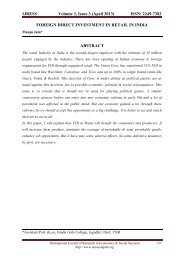eLegalix - Allahabad High Court Judgment Information System ...
eLegalix - Allahabad High Court Judgment Information System ...
eLegalix - Allahabad High Court Judgment Information System ...
You also want an ePaper? Increase the reach of your titles
YUMPU automatically turns print PDFs into web optimized ePapers that Google loves.
JUDGMENT/ORDER IN - WRIT - C No. 37443 of 2011 at <strong>Allahabad</strong> Dated-21.10....http://elegalix.allahabadhighcourt.in/elegalix/WebShow<strong>Judgment</strong>.doPage 196 of 19710/21/2011In Indian Industries Association Vs. State of U.P. 2007 (4) AWC 3825, one of us (S.U. Khan, J.) while dealing withthe strife of capital and labour (in respect of wages) observed in Paras-27 & 28 as follows:As far as industries are concerned, owner is primarily concerned with profit, worker with wage while interest of thepublic demands good quantity and quality of commodity/service at affordable cost. It is a sort of strife. The strifebetween capital and labour and the extreme stand which each takes and extreme arguments which each sideadvances are best illustrated by the drama 'strife' by John Galsmorthy written in 1909. Each side may havelegitimate arguments in its favour. However, this is a world of compromises and no argument can be brought to itslogical conclusion. Philosophers and mad dogs are liable to be shot because they want to bring their arguments totheir logical conclusion (Thomas Hardy in 'Far from the mad ding crowd').Balance in nature is necessary for survival of the Universe. Similarly balance in society is also essential for itssurvival. Economic aspect is one of the most important aspects of human society. Economic balance will havetherefore to be given a very high priority. For the sake of economic balance alongwith higher earning of uppersection of the society, becoming higher and higher rapidly, good income/wages will have to be ensured to thelower section of the society.We have tried to maintain the delicate balance through the leading judgment delivered by Hon'ble AshokBhushan, J.Land may be acquired for a public purpose. Public purposes for the sake of land acquisition may be divided intotwo broad categories. One may be termed as core, primary public purpose, e.g. purposes connected with military,construction of government offices, hospitals, government educational institutions, canals, roads and bridges etc.The other category may be termed as secondary public purpose which includes establishment of industries anddevelopment of urban areas which basically means construction of housing units. (In today's ''Times of India',<strong>Allahabad</strong> Edition there is a news on first page titled as ''Delhi Topples Mumbai as Maximum City'. It is reportedthereunder that close to 2.2 crore people now live in Delhi's extended urban sprawl.) In the judgment of theSupreme <strong>Court</strong> reported in Bondu Ramaswamy Vs. Bangalore Development Authority, 2010 (7) SCC 129, (inPara-151), three types of public purposes for land acquisition have been mentioned. The purposes at Serial No.(i)may be described as core, primary public purpose and purposes at Serial No.(ii) (establishment of industries) &(iii) (urban area development) may be described as secondary purposes. In respect of core, primary publicpurpose normally no concept of profit making is involved. Accordingly, for such acquisitions greater latitude maybe given and strict compliance of different provisions of Land Acquisition Act may not be insisted. Compensationas determined under the Land Acquisition Act can also be treated to be quite appropriate. As observed in theaforesaid Supreme <strong>Court</strong> authority, normally there is no resentment against such type of acquisitions.However as far as acquisitions for secondary purposes i.e. for establishing industries and constructing residentialunits are concerned, they stand on slightly different footing. There cannot be any doubt that such acquisitions alsoserve public purpose, however the factor of profit making is quite apparent therein. The purpose of State inproviding land for establishment of industries is that people will get employment and goods will be manufacturedincreasing the wealth of the nation which is squarely a public purpose. However the purpose of the person whoestablishes industry would be only and only to earn profit. There is absolutely nothing wrong in it. Business isalways done for profit. However for establishing industry the three major, capital investments are land, buildingand machinery and the industrialist has to pay good amount for each.Similarly when land is allotted to builders for constructing residential units, their purpose would be to earn profitand the purpose of the State would be to provide properly planned residential units to the public. However if theState itself gets the residential units constructed it would be earning huge profit.Serving of public purpose by the industrialist or the builder is an unintended fall out of his business activity. Noprivate person or non-governmental company does business for the purpose of providing employment or for anyother purpose except earning profit.If on the acquired land profit earning activity is carried out then the person whose land has been acquired has gotfull right to have something like a share in the profit. It is for this reason that during recent past in different parts ofthe country there has been public opposition of various degrees to the land acquisition for the purposes ofconstructing dwelling units or establishing industries by private persons or non-governmental companies. (Asgovernment is rolling back its direct role in industrialization by running industries, hence acquisition forestablishing government industries is now a thing of past).The first paragraph and first sentence of the second paragraph of the book "Law in a Changing Society" written byW. Friedmann are quoted below:"The controversy between those who believe that law should essentially follow, not lead, and that it should do soslowly, in response to clearly formulated social sentiment- and those who believe that the law should be adetermined agent in the creation of new norms, is one of the recurrent themes of the history of legal thought. It istellingly illustrated by the conflicting approaches of Savigny and Bentham.For Savigny, bitter opponent of the rationalizing and law making tendencies spurred by the French Revolution, lawwas ''found', not ''made'."Today, hardly any jurist agrees with Savigny. However, law may not be ''found' but its need can very well be
















